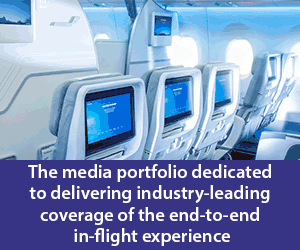Inflight editor Alexander Preston summarises the latest happenings across IFEC and cabin technology.
Despite the huge sums of money invested by the aviation industry into the passenger experience and attempts to engender greater loyalty, it seems the allure of airlines has lost its sheen with UK consumers.
That’s the message of the fourth annual Brand Relevance Index (BRI) from global brand and marketing consultancy Prophet, which ranks the most relevant brands in consumers’ lives today.
For the first time, no aviation companies have made it into the top 50:
Virgin Atlantic drops fifteen places to #64, despite completing a four year £300 million investment in customer experience, which included becoming the first European carrier to be fully Wi-Fi-enabled, and providing personal USB power at every seat, and achieving the highest customer satisfaction scores for transatlantic flights (IATA Airstat 2017).
British Airways falls from #56 in 2017 to #69, amidst a five-year £4.5 billion investment in its customers, which has so far seen an enhanced IFE library, new catering offerings in its World Traveller and Club World, and new cabins in its Boeing 777 aircraft operating out of Gatwick. The new aircraft cabins feature an in-flight Panasonic entertainment system which has been updated with larger HD screens. However, the recent revelation that it suffered a data breach which compromised the card payment details of 380,000 customers from its website and airline mobile app, may well see that ranking fall further next year.
For Ryanair, despite rolling out Year 4 of its “Always Getting Better” programme, which included connecting flights via Rome, Milan and Porto, a long-haul flights partnership with Air Europa via Madrid, reduced check-in bag fees, an exclusive partnership with the Erasmus Student Network, and a new Ryanair Rooms website and App, the airline drops from #221 in 2017 to #233 this year. In July, the airline was forced to cancel 600 flights due to industrial action by cabin crew, and the airline is now bracing itself for what is being called the “biggest strike action the company has ever seen” later this month.
Bucking the trend is easyJet, now at #128, rising from #144 in 2017. EasyJet recently launched a recruitment drive for 28 data scientists to join in the airline’s drive towards data. Luca Zuccoli, the airline’s first chief data officer, joined in August.
“Besides being technology-led disruptive companies, what many of the top 10 [relevant brands] have in common is that they’re fast earning consumer trust by leveraging data to enhance the brand experience and connect with consumers on a deeper and more personal level,” said Rune Gustafson, president EMEA at Prophet.
EasyJet may be some way from being a relevant brand, which is topped by Apple, but its upwards trajectory must be welcomed. It’s use of data to improve the customer experience, customer loyalty, improve operational efficiency while driving down cost and increasing revenue, may well see it climb further and become an industry leader.
In Germany, the BRI finds Lufthansa at #76, Eurowings at #214, and SWISS at #222. However, Southwest appears at #46 in the US rankings, proving that airline brands can make emotional connections, earn trust and fulfil a larger purpose.
On the topic of connections, please do join the Inflight team and our market intelligence partners Valour Consultancy for a beer on Tuesday 25 September.
The drinks reception will take place at the Inflight booth (#417) from 3:00pm–6:00pm. Wine and various soft drinks will also be available!
The editor’s comment is published weekly as an accompaniment to the Inflight e-newsletter. If you do not currently receive our email updates, you can subscribe here.






